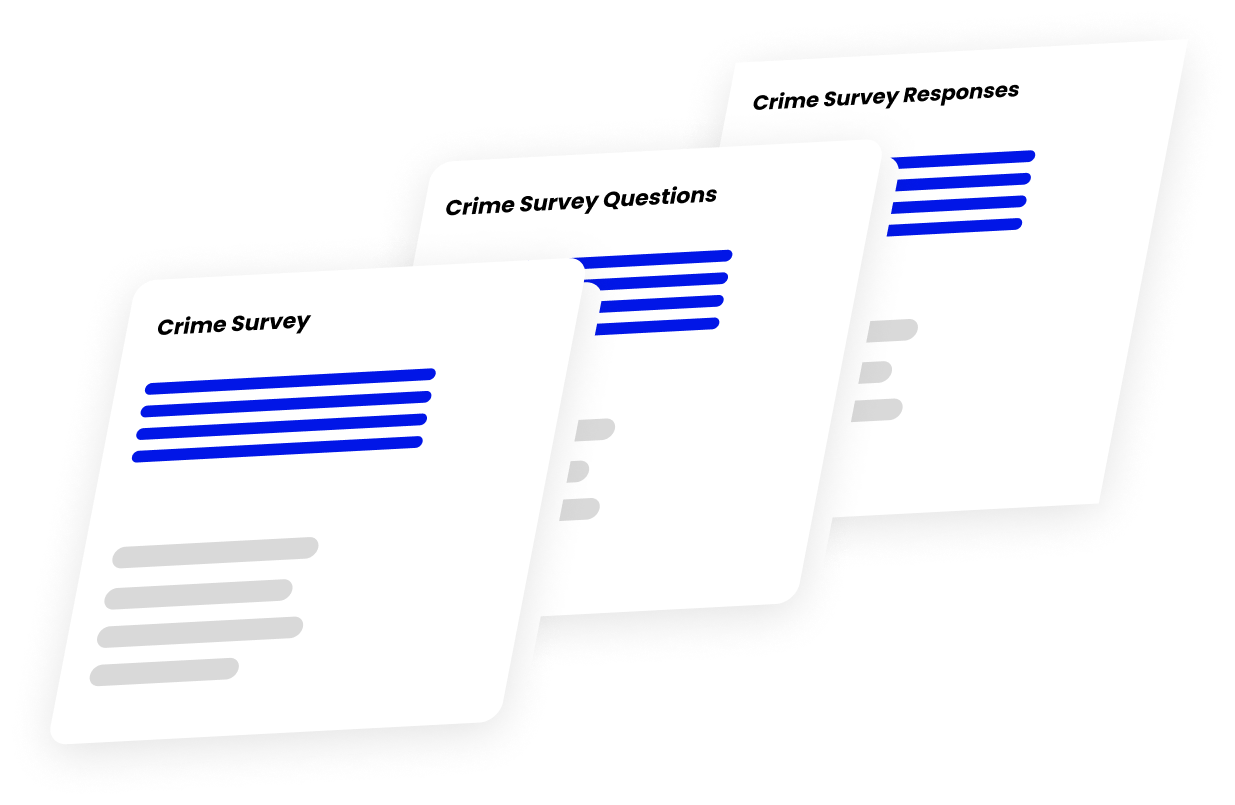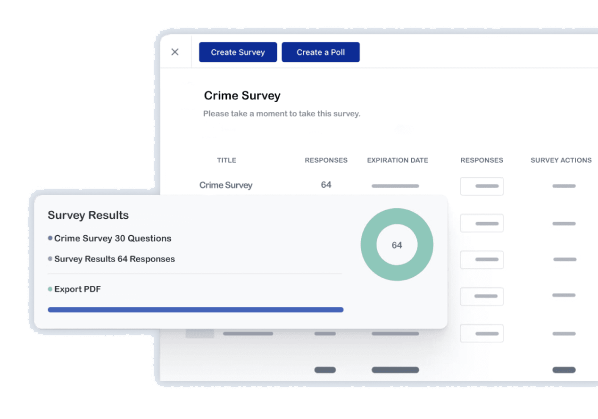Crime Survey
Crime surveys involve collecting data about criminal activity in a specific location. This information can be used by law enforcement agencies to understand the factors that contribute to crime in that area and to develop strategies for preventing future crimes.
What Is A Crime Survey?
Crime surveys are statistical surveys that collect data on criminal activity in a given area. In addition to providing information on many types of crimes and the characteristics of victims and offenders, they can be used to track changes in crime rates over time or compare rates between different areas. Police departments should deploy such tactics to gather and analyze feedback from residents and strategize ways to prevent crime.
Police departments across the country should conduct crime surveys. These surveys should be short and sent directly to the residents. The results can improve your understanding of when and where crimes occur and when they are most likely to occur. Crime surveys can provide valuable information about the types of crime that are most prevalent in a community and areas where crime is most likely to occur. They can also help identify those most at risk of becoming victims of crime.
In addition, crime surveys can help to assess the impact of crime on victims and witnesses and to identify the needs of these groups. Crime surveys can play an important role in crime prevention by helping to identify the factors that contribute to crime. They can also help to evaluate the effectiveness of crime prevention initiatives. Crime surveys can help to assess the impact of crime on the community and to identify the needs of the community concerning crime. A crime survey aims to collect data about crime in a specific area, analyze the data and prevent crime from occurring.
Why Should It Be Done?
Crime surveys can be an important tool for law enforcement agencies and policymakers because they provide valuable insights into the nature and prevalence of crime in a particular area. By collecting and analyzing data on crime trends and patterns, agencies can develop targeted strategies for reducing crime and improving public safety.
Additionally, crime surveys can help identify potential risk factors and underlying causes of criminal activity, which can inform the development of prevention and intervention programs. Crime surveys can help law enforcement agencies and policymakers make informed decisions about allocating resources and addressing crime in their communities.

Here are some reasons why police departments should conduct frequent Crime Surveys:
- To provide accurate and up-to-date information on the level of crime in society.
- To help identify trends in crime and understand what factors may be driving these trends.
- To assess the effectiveness of crime prevention and law enforcement strategies.
- To inform the public about the level of crime in their community and how they can protect themselves from becoming victims.
- To help policy-makers develop evidence-based policies to reduce crime and keep communities safe.
- To assess the impact of changes in the criminal justice system on crime rates.
- To monitor changes in public attitudes towards crime and the criminal justice system.
- To inform decisions about the allocation of resources within the criminal justice system.
- To support the work of crime analysts and other professionals who use data to inform their work.
- To understand the prevalence of crime in a given area.
- To identify crime hotspots.
- To understand the types of crime being committed.
- To identify vulnerable groups.
- To understand how crime affects the community.
- To develop crime prevention strategies.
- To evaluate the effectiveness of crime prevention initiatives.
- To allocate resources effectively.
- To engage the community in crime prevention.
- To build community cohesion.
- To increase public safety.
- To reduce the fear of crime.
- To improve the quality of life.
- To reduce the social and economic costs of crime.
- To make the community a safer place for all.
- To increase public confidence in the police.
- To improve police effectiveness.
- To make the police more responsive to the community.
- To make the police more effective in preventing and solving crime.
- To make the community feel safer.
Benefits Of Crime Survey
1. Improving public safety: By understanding the factors that contribute to crime and the prevalence of different types of crime, law enforcement agencies can develop targeted strategies for reducing crime and improving public safety.
2. Allocating resources effectively: Crime surveys can help identify areas with high levels of crime, which can inform the allocation of resources to those areas.
3. Identifying risk factors: Crime surveys can help identify potential risk factors for criminal behavior, such as social and economic conditions, drug use, and access to weapons. This information can inform the development of prevention and intervention programs.
4. Engaging the community: Crime surveys can involve input and participation from community members, which can help build trust and cooperation between law enforcement and the community.
5. Evaluating the effectiveness of crime prevention efforts: Crime surveys can be used to track changes in crime rates over time and evaluate the effectiveness of different prevention and intervention programs.

Conducting crime surveys can provide several benefits, including:
- Provide valuable information on the types of crimes that are being committed, who is committing them, and where they are occurring.
- They can provide more precise information on crimes that might not be included in official statistics.
- Useful for comprehending trends of large-scale criminality for comparing to prior years to identify trends in crime.
- Provide accurate statistics on the frequency of various sorts of crime.
- Provide crucial information on the criminal patterns in specific places.
- To comprehend the effects of crime on victims and whether the responses to their experiences are appropriate and effective.
- Help build trust between the community and the police department.
- Crime surveys are highly effective in understanding the community.
- Provide crime updates during city hall meetings.
- Evidence from research is crucial for the advancement of criminal justice decision-making.
- Provides a more accurate reflection of long-term patterns than crime data from the police.
- Evaluating the effectiveness of crime prevention efforts.
- Identifying the factors that contribute to crime and developing strategies to prevent it.
- Enables the comprehension of certain criminal trends that may be occurring in society.
- Provide accurate statistics on the frequency of various crimes.
- Crime surveys can help secure police grants.
- Allocate resources to areas where crime is most prevalent.
- Help to develop policies and programs that reduce the impact of crime on victims.


